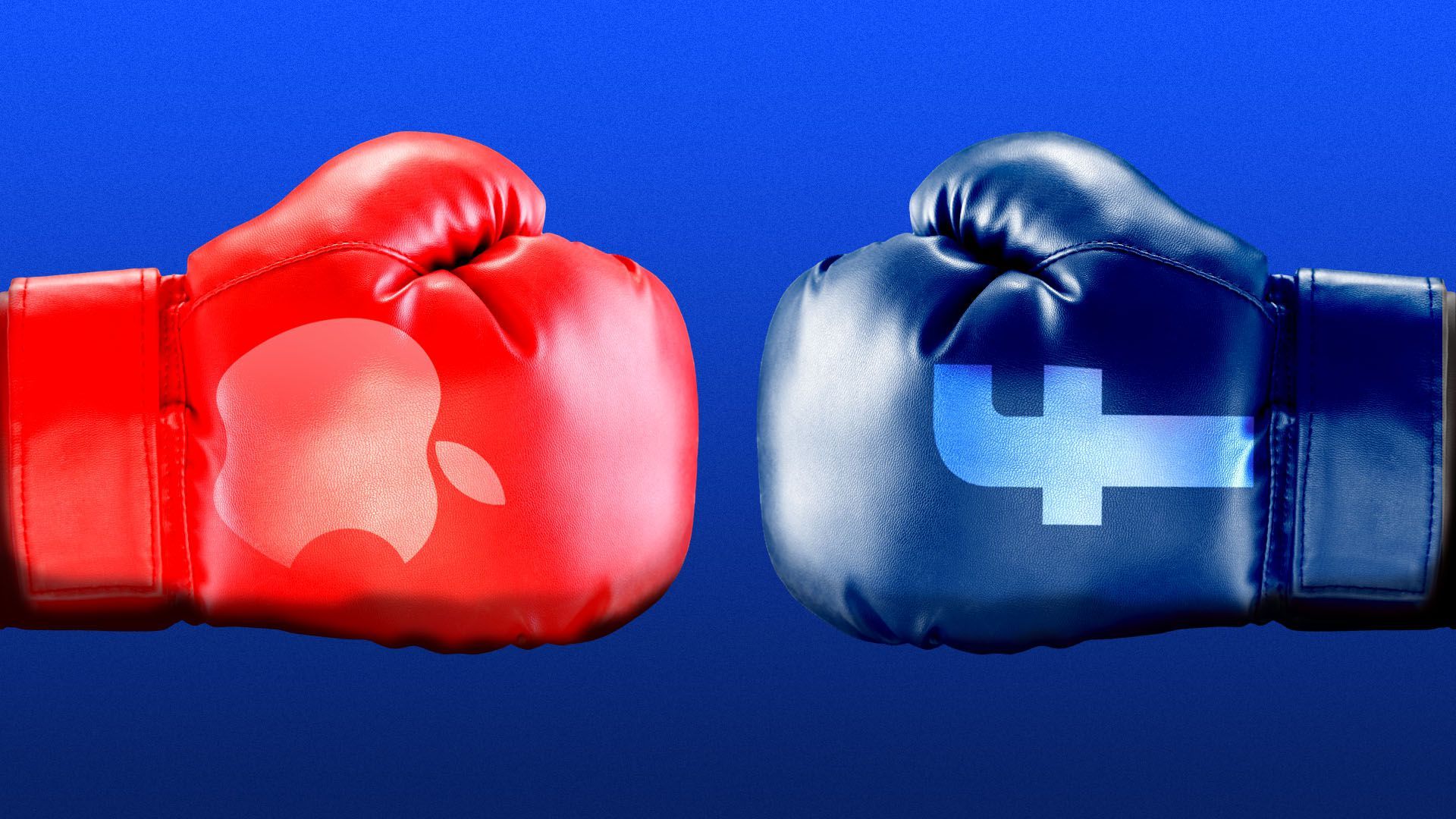Frenemies Facebook and Apple square off
Add Axios as your preferred source to
see more of our stories on Google.

Illustration: Sarah Grillo/Axios
Facebook and Apple are fighting an increasingly high stakes battle over user privacy and access to the iOS App Store, deepening a rift between two of the most powerful companies in Silicon Valley.
Why it matters: The two companies, along with Google and Amazon, are being challenged over a range of issues, from abuse of power to violations of privacy to allowing hate and misinformation to flourish. By trading accusations, Facebook and Apple could just be handing more ammo to critics and regulators — but at the same time, conflict between these giants could be read as a sign of competitive life and a rebuttal to antitrust charges.
Driving the news: A new version of Apple' iOS limits the use of some kinds of user-tracking tech that advertisers on Facebook use to target individuals, and last week Facebook warned that the change would reduce the ads' effectiveness and cut into revenue.
- At a Thursday companywide meeting, per Buzzfeed, Facebook CEO Mark Zuckerberg said Apple has a "unique stranglehold as a gatekeeper on what gets on phones,” that it "blocks innovation, blocks competition” and “charge[s] monopoly rents.”
- Zuckerberg's charge follows a number of high-profile cases in which app developers — including the maker of the phenomenally popular game Fortnite — have challenged Apple's rules for controlling App Store revenue.
The big picture:
- Facebook, as the owner of the world's largest social network, has also become a key source by which Americans get their news and entertainment. But Apple, with products like Apple News, Apple News+, and Apple TV+, is competing to be an information destination.
- Apple has made the iPhone the most popular high-end phone brand in the U.S., though it splits the overall market with Android. That lets Apple wield a tight grip on software makers' access to the most lucrative customers. But some third-party developers have long complained that Apple throws its weight around, and Facebook has now joined them.
Between the lines: For years, Apple's biggest enemy in Silicon Valley was Google, which created the Android operating system that took off after the iPhone's debut and now controls three quarters of the global smartphone market.
- Apple founder Steve Jobs stewed over what he saw as a betrayal and launched a giant, now-settled legal battle alleging Samsung and Google essentially copied the iPhone.
- More recently though, Apple's ire has been pointed at Facebook. Google, like Facebook, makes its money targeting its users with ads.
Apple's argument: For years Apple has proudly positioned the iPhone as a more secure and more private alternative to the Android competition.
- As Facebook and Google have faced mounting criticism for their user tracking, Apple CEO Tim Cook has frequently joined the chorus.
- In 2018 Cook declared that privacy was "a fundamental human right" as he announced Apple would effectively ban Facebook's ubiquitous "like" button from working outside of Facebook's own pages and apps.
Flashback: The animosity isn't just over philosophy and business models. In 2019, Apple shut down a Facebook "research" app that allowed Facebook to pay users so it could track everything they did on their phones.
- Then Apple also temporarily cut off Facebook's own developers from access to test versions of their iOS software as well.
- The move was widely viewed in the industry as Apple delivering a sharp rap on the knuckles to Facebook — and a public demonstration of how hard it would come down on developers who failed to take privacy seriously.
Yes, but: However hot the fight gets, these two companies need each other. Just as Apple risks losing business in China if it can't offer WeChat, it would lose a lot of customers in the U.S. and elsewhere if Facebook's services — including WhatsApp and Instagram — were not available for the iPhone. By the same token, many of Facebook's most valuable customers access the service via Apple devices.
Our thought bubble: Each company has plenty of ammunition to attack the other as a monopolist, and that's why critics argue they should both be under closer antitrust scrutiny.
- Historically, the big tech companies have maintained power by dominating a key market while competing with one another at the edges. The Apple-Facebook fight shows that they're now willing to take swings at each other's core businesses.

